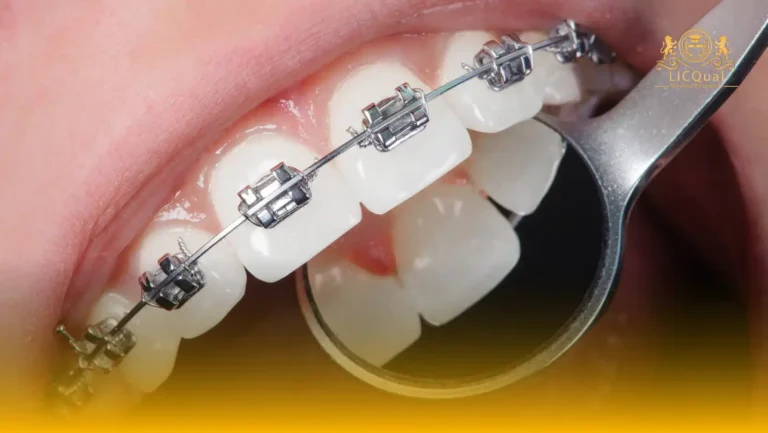The LICQual Level 3 Diploma in Clinical Nutrigenomics (Dip Nutrigenomics) is a specialised qualification designed for learners seeking to advance their expertise in the emerging field of nutrigenomics, the science exploring the interaction between nutrition and genes. This diploma provides in-depth knowledge of how genetic variations influence nutrient metabolism, dietary requirements, and personalised nutrition strategies, equipping learners to apply cutting-edge scientific insights in professional practice.
This qualification is ideal for healthcare professionals, nutritionists, dietitians, wellness consultants, and other practitioners seeking to enhance their career prospects, expand their knowledge, and engage in meaningful Continuing Professional Development (CPD). Learners gain the skills to assess genetic influences on nutrition, design personalised dietary interventions, and critically evaluate scientific research in nutrigenomics, enabling them to make informed, evidence-based decisions that improve health outcomes.
LICQual ensures that all centres delivering this diploma maintain the highest standards of education and training. Centres are required to have competent and qualified staff, along with access to up-to-date learning resources, practical tools, and facilities to support high-quality teaching and learner success. This ensures learners receive a robust educational experience that combines theoretical knowledge with practical applications.
By completing this diploma, learners not only achieve a recognised qualification but also strengthen their professional credibility and CPD profile. The programme is structured to provide a balanced blend of scientific theory and practical application, empowering learners to implement nutrigenomic principles confidently within clinical, wellness, and health-focused environments.
Course Overview
Qualification Title
LICQual Level 3 Diploma in Clinical Nutrigenomics (Dip Nutrigenomics)
Total Units
6
Total Credits
60
GLH
240
Qualification #
LICQ2201039
Qualification Specification
To enroll in the LICQual Level 3 Diploma in Clinical Nutrigenomics (Dip Nutrigenomics), applicants must meet the following criteria:
|
Qualification# |
Unit Title |
Credits |
GLH |
|---|---|---|---|
|
LICQ2201039-1 |
Fundamentals of Genetics and Genomics |
10 |
40 |
|
LICQ2201039-2 |
Nutrigenomics Principles and Applications |
10 |
40 |
|
LICQ2201039-3 |
Human Nutrition and Metabolic Pathways |
10 |
40 |
|
LICQ2201039-4 |
Nutrigenomic Assessment and Testing |
10 |
40 |
|
LICQ2201039-5 |
Research Methods in Nutrigenomics |
10 |
40 |
|
LICQ2201039-6 |
Practical Applications of Clinical Nutrigenomics |
10 |
40 |
By the end of this course, learners will be able to:
Unit 1: Fundamentals of Genetics and Genomics
By the end of this unit, the learner will be able to:
- Explain the basic principles of genetics, including gene structure, function, and inheritance
- Describe the processes of DNA replication, transcription, and translation
- Identify genetic variations and their potential impact on human health
- Analyse the role of genomics in personalised healthcare and nutrition
Unit 2: Nutrigenomics Principles and Applications
By the end of this unit, the learner will be able to:
- Explain the relationship between diet, gene expression, and health outcomes
- Analyse how nutritional factors can modulate genetic expression
- Evaluate nutrigenomic interventions for improving health and preventing disease
- Apply nutrigenomic principles to develop personalised nutrition strategies
Unit 3: Human Nutrition and Metabolic Pathways
By the end of this unit, the learner will be able to:
- Explain the roles of macronutrients and micronutrients in human metabolism
- Analyse metabolic pathways and their interaction with genetic variations
- Assess the impact of individual genetic differences on nutrient requirements
- Evaluate dietary strategies for optimising metabolic health based on genomics
Unit 4: Nutrigenomic Assessment and Testing
By the end of this unit, the learner will be able to:
- Explain methods and techniques used for genetic testing in nutrigenomics
- Interpret nutrigenomic reports to identify individual dietary needs
- Assess the reliability and validity of nutrigenomic testing methods
- Apply genetic information to design personalised nutrition interventions
Unit 5: Research Methods in Nutrigenomics
By the end of this unit, the learner will be able to:
- Explain research methodologies relevant to nutrigenomics studies
- Collect, analyse, and interpret data from nutrigenomic research
- Critically evaluate scientific literature and evidence-based studies
- Apply research findings to inform professional practice and decision-making
Unit 6: Practical Applications of Clinical Nutrigenomics
By the end of this unit, the learner will be able to:
- Apply nutrigenomic knowledge to create personalised nutrition plans
- Conduct dietary assessments and make recommendations based on genetic profiles
- Integrate evidence-based nutrigenomic principles into clinical or wellness practice
- Demonstrate professional practice in using genomics to support health outcomes
The LICQual Level 3 Diploma in Clinical Nutrigenomics (Dip Nutrigenomics) is designed for learners who want to explore the science of personalized nutrition and genetics. This internationally recognized diploma is ideal for healthcare professionals, dietitians, educators, researchers, and wellness experts who aim to apply nutrigenomics in clinical practice. The Diploma in Clinical Nutrigenomics online offers flexibility, affordability, and global accreditation, making it suitable for professionals and students worldwide.
1. Healthcare Professionals
- Doctors, nurses, and allied health staff seeking advanced knowledge in nutrigenomics
- Public health workers aiming to integrate genetic nutrition into community programs
- Hospital staff interested in accredited clinical nutrigenomics qualifications
- Professionals looking for a Level 3 clinical nutrigenomics course
- Those wanting globally recognized certification in personalized healthcare
2. Dietitians and Nutrition Experts
- Practicing dietitians aiming to expand into genetic nutrition and personalized diet planning
- Nutritionists seeking accredited training in clinical nutrigenomics
- Professionals wanting to design DNA‑based nutrition programs for patients
- Individuals looking for a diploma in clinical nutrigenomics online
- Those aiming to strengthen their career profile with international accreditation
3. Educators and Academic Trainers
- Teachers delivering nutrition and health education in schools or universities
- Trainers developing nutrigenomics and personalized nutrition programs
- Educators seeking Dip Nutrigenomics qualification for credibility
- Professionals wanting to integrate genetic nutrition into curriculum design
- Those aiming to inspire future healthcare leaders through education
4. Researchers and Genetic Scientists
- Professionals working in genetics and molecular biology interested in nutrition applications
- Researchers exploring the link between DNA and dietary outcomes
- Scientists seeking accredited training in clinical nutrigenomics studies
- Individuals aiming to contribute to innovative healthcare research
- Those wanting to combine genetics expertise with nutrition science
5. Wellness and Fitness Professionals
- Fitness trainers expanding into personalized nutrition based on genetic profiles
- Wellness consultants seeking a diploma in nutrigenomics and dietetics
- Professionals offering DNA‑based diet planning and lifestyle coaching
- Individuals wanting internationally recognized certification in nutrigenomics
- Those aiming to combine fitness expertise with genetic nutrition knowledge
6. Career Changers and Lifelong Learners
- Individuals exploring new opportunities in healthcare and nutrigenomics
- Professionals from other fields seeking a career in personalized nutrition
- Learners interested in flexible online diploma programs
- Those motivated to gain practical skills in genetic nutrition and wellness
- People passionate about making a difference in healthcare innovation
7. International Students and Global Learners
- Students seeking globally recognized nutrigenomics qualifications
- Learners aiming for career opportunities across different countries
- Professionals looking for affordable, accredited online diplomas
- Individuals preparing for international healthcare and education roles
- Those wanting a diploma that meets global standards in clinical nutrigenomics
To deliver the LICQual Level 3 Diploma in Clinical Nutrigenomics effectively, centres must meet the following requirements:
- Qualified and Competent Staff: All teaching and assessment personnel must hold relevant qualifications and demonstrate expertise in genetics, nutrition, or related fields.
- Access to Learning Resources: Centres must provide learners with up-to-date textbooks, scientific journals, digital learning platforms, and practical tools necessary for effective study.
- Facilities for Practical Learning: Centres should have appropriate laboratory, simulation, or clinical facilities to enable learners to apply nutrigenomic principles in a practical setting.
- Assessment and Monitoring Systems: Centres must have structured assessment procedures, learner progress tracking, and mechanisms to provide constructive feedback in line with LICQual standards.
- Health and Safety Compliance: Learning environments must adhere to local health and safety regulations to ensure safe participation in practical activities.
- Quality Assurance Processes: Centres must implement robust quality assurance systems to maintain high standards of teaching, learning, and assessment.
- Learner Support: Centres should provide guidance, mentorship, and additional resources to support learner success and progression.
These requirements ensure that learners receive high-quality, internationally-standardised training in clinical nutrigenomics, combining theoretical knowledge with practical skills for professional application.
Assessment and Verification
All units within this qualification are subject to internal assessment by the approved centre and external verification by LICQual. The qualification follows a criterion-referenced assessment approach, ensuring that learners meet all specified learning outcomes.
To achieve a ‘Pass’ in any unit, learners must provide valid, sufficient, and authentic evidence demonstrating their attainment of all learning outcomes and compliance with the prescribed assessment criteria. The Assessor is responsible for evaluating the evidence and determining whether the learner has successfully met the required standards.
Assessors must maintain a clear and comprehensive audit trail, documenting the basis for their assessment decisions to ensure transparency, consistency, and compliance with quality assurance requirements.







